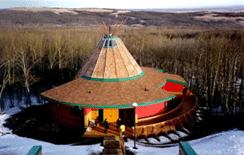
The article has been edited to include a response by the Correctional Service of Canada.
The Congress of Aboriginal People (CAP) are calling out the Correctional Services of Canada (CSC) for a lack of mental health support for Indigenous inmates following the death of Cassandra Fox, a member of Sweetgrass First Nation who was being held at the Okimaw Ohci Healing Lodge near Maple Creek when she committed suicide on Jan. 18.
“The epidemic of suicide among Indigenous inmates in the care of Correction Services Canada has claimed another life, due to inaction and a failure to provide effective, culturally appropriate supports administered by Indigenous people themselves,” reads a statement from CAP.
At the time of her death, the 27-year-old had been serving a sentence of two years, six months and twenty-nine days for accessory after the fact to murder in the 2020 death of Bradley Ham.
“The Congress of Aboriginal Peoples calls on CSC to ensure the inquest of her death is conducted immediately and publicly” said CAP Vice Chief Kim Beaudin. “Measures must be immediately taken to address the epidemic of suicide among inmates, in particular Indigenous inmates in CSC custody.”
During Fox’s trial, the court heard how she faced numerous Gladue factors in her life as a descendent of residential school survivors who struggled with addictions. According to CAP, Fox was held in over-crowded conditions at Pine Grove Correctional Center in Prince Albert, where she contracted COVID-19, before being transferred Okimaw Ohci.
“Healing lodges were never meant to be CSC institutions,” said Beaudin. “They were meant to be operated by Indigenous communities themselves, to help heal the trauma of genocide and racism and discrimination. The continued refusal to properly fund Indigenous communities to operate Healing Lodges themselves undermines the whole purpose of this institution, and puts inmate lives at risk.”
“CAP continues to call on Correction Services Canada to ensure the availability of adequate mental health supports, to end isolation and other practices listed as “torture”, and to fulfill their obligations to ensure the safety of inmates under their care,” she added.
Fox’s death follows several other self-harm and suicide incidents among Indigenous people in CSC institutions, such as the deaths of Kendal Campeau and Curtis McKenzie. The CSC has acknowledged six inmate deaths in Jan. of 2023 alone.
In an emailed response to the Herald on Jan. 28, the Correctional Service of Canada said ensuring the safety and security of their institutions, staff, inmates, and the public remains a top priority.
“The CSC takes the death of an inmate very seriously and the loss of a life is a tragedy at any time,” said the CSC. “Our thoughts go out to the family and friends of Cassandra Fox.”
The email explained that in the event of an inmate’s death, CSC will review the circumstances and policy requires that the police and the coroner be notified. The policing agency will conduct an internal investigation while the coroner determines the cause of death, with the scheduling of a Coroner Inquest to follow.
A Coroner inquest is a public hearing where witnesses are called and evidence is heard before six jury members. In Saskatchewan, an inquest is mandatory when a death happens to a person held in provincial or federal custody.
Following the inquest, the jury may provide recommendations to CSC based on their findings. The Jury Findings and recommendations are public information and can be found on the Saskatchewan Coroners Service webpage. According to the CSC, the recommendations are reviewed, and a written response is then provided to the Chief Coroner’s Office.
